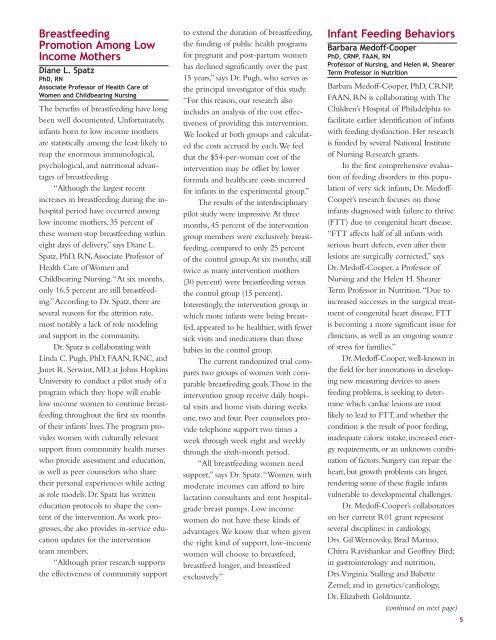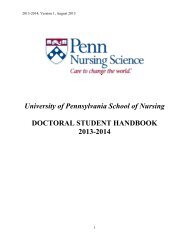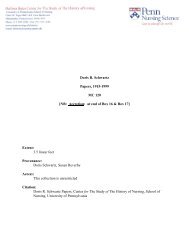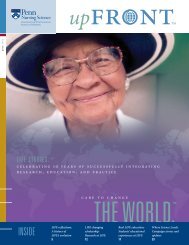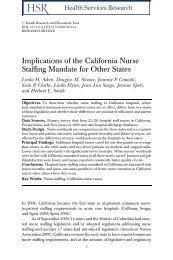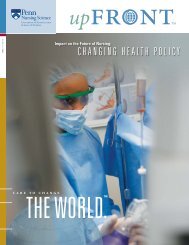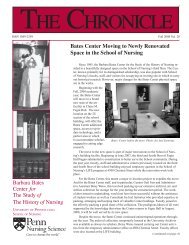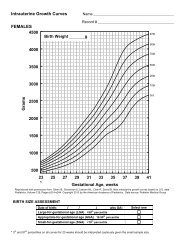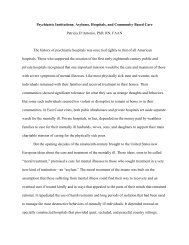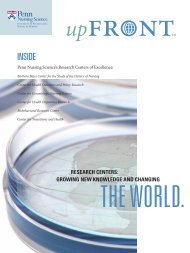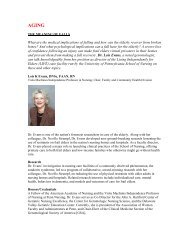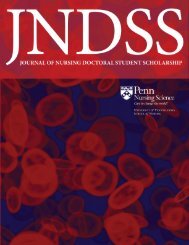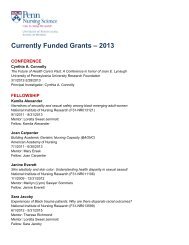Penn Nursing 090805_final_4c - University of Pennsylvania School ...
Penn Nursing 090805_final_4c - University of Pennsylvania School ...
Penn Nursing 090805_final_4c - University of Pennsylvania School ...
Create successful ePaper yourself
Turn your PDF publications into a flip-book with our unique Google optimized e-Paper software.
Breastfeeding<br />
Promotion Among Low<br />
Income Mothers<br />
Diane L. Spatz<br />
PhD, RN<br />
Associate Pr<strong>of</strong>essor <strong>of</strong> Health Care <strong>of</strong><br />
Women and Childbearing <strong>Nursing</strong><br />
The benefits <strong>of</strong> breastfeeding have long<br />
been well documented. Unfortunately,<br />
infants born to low income mothers<br />
are statistically among the least likely to<br />
reap the enormous immunological,<br />
psychological, and nutritional advantages<br />
<strong>of</strong> breastfeeding.<br />
“Although the largest recent<br />
increases in breastfeeding during the inhospital<br />
period have occurred among<br />
low income mothers, 35 percent <strong>of</strong><br />
these women stop breastfeeding within<br />
eight days <strong>of</strong> delivery,” says Diane L.<br />
Spatz, PhD, RN,Associate Pr<strong>of</strong>essor <strong>of</strong><br />
Health Care <strong>of</strong> Women and<br />
Childbearing <strong>Nursing</strong>.“At six months,<br />
only 16.5 percent are still breastfeeding.”According<br />
to Dr. Spatz, there are<br />
several reasons for the attrition rate,<br />
most notably a lack <strong>of</strong> role modeling<br />
and support in the community.<br />
Dr. Spatz is collaborating with<br />
Linda C. Pugh, PhD, FAAN, RNC, and<br />
Janet R. Serwint, MD, at Johns Hopkins<br />
<strong>University</strong> to conduct a pilot study <strong>of</strong> a<br />
program which they hope will enable<br />
low income women to continue breastfeeding<br />
throughout the first six months<br />
<strong>of</strong> their infants’ lives.The program provides<br />
women with culturally relevant<br />
support from community health nurses<br />
who provide assessment and education,<br />
as well as peer counselors who share<br />
their personal experiences while acting<br />
as role models. Dr. Spatz has written<br />
education protocols to shape the content<br />
<strong>of</strong> the intervention.As work progresses,<br />
she also provides in-service education<br />
updates for the intervention<br />
team members.<br />
“Although prior research supports<br />
the effectiveness <strong>of</strong> community support<br />
to extend the duration <strong>of</strong> breastfeeding,<br />
the funding <strong>of</strong> public health programs<br />
for pregnant and post-partum women<br />
has declined significantly over the past<br />
15 years,” says Dr. Pugh, who serves as<br />
the principal investigator <strong>of</strong> this study.<br />
“For this reason, our research also<br />
includes an analysis <strong>of</strong> the cost effectiveness<br />
<strong>of</strong> providing this intervention.<br />
We looked at both groups and calculated<br />
the costs accrued by each.We feel<br />
that the $54-per-woman cost <strong>of</strong> the<br />
intervention may be <strong>of</strong>fset by lower<br />
formula and healthcare costs incurred<br />
for infants in the experimental group.”<br />
The results <strong>of</strong> the interdisciplinary<br />
pilot study were impressive.At three<br />
months, 45 percent <strong>of</strong> the intervention<br />
group members were exclusively breastfeeding,<br />
compared to only 25 percent<br />
<strong>of</strong> the control group.At six months, still<br />
twice as many intervention mothers<br />
(30 percent) were breastfeeding versus<br />
the control group (15 percent).<br />
Interestingly, the intervention group, in<br />
which more infants were being breastfed,<br />
appeared to be healthier, with fewer<br />
sick visits and medications than those<br />
babies in the control group.<br />
The current randomized trial compares<br />
two groups <strong>of</strong> women with comparable<br />
breastfeeding goals.Those in the<br />
intervention group receive daily hospital<br />
visits and home visits during weeks<br />
one, two and four. Peer counselors provide<br />
telephone support two times a<br />
week through week eight and weekly<br />
through the sixth-month period.<br />
“All breastfeeding women need<br />
support,” says Dr. Spatz.“Women with<br />
moderate incomes can afford to hire<br />
lactation consultants and rent hospitalgrade<br />
breast pumps. Low income<br />
women do not have these kinds <strong>of</strong><br />
advantages.We know that when given<br />
the right kind <strong>of</strong> support, low-income<br />
women will choose to breastfeed,<br />
breastfeed longer, and breastfeed<br />
exclusively.”<br />
Infant Feeding Behaviors<br />
Barbara Med<strong>of</strong>f-Cooper<br />
PhD, CRNP, FAAN, RN<br />
Pr<strong>of</strong>essor <strong>of</strong> <strong>Nursing</strong>, and Helen M. Shearer<br />
Term Pr<strong>of</strong>essor in Nutrition<br />
Barbara Med<strong>of</strong>f-Cooper, PhD, CRNP,<br />
FAAN, RN is collaborating with The<br />
Children’s Hospital <strong>of</strong> Philadelphia to<br />
facilitate earlier identification <strong>of</strong> infants<br />
with feeding dysfunction. Her research<br />
is funded by several National Institute<br />
<strong>of</strong> <strong>Nursing</strong> Research grants.<br />
In the first comprehensive evaluation<br />
<strong>of</strong> feeding disorders in this population<br />
<strong>of</strong> very sick infants, Dr. Med<strong>of</strong>f-<br />
Cooper’s research focuses on those<br />
infants diagnosed with failure to thrive<br />
(FTT) due to congenital heart disease.<br />
“FTT affects half <strong>of</strong> all infants with<br />
serious heart defects, even after their<br />
lesions are surgically corrected,” says<br />
Dr. Med<strong>of</strong>f-Cooper, a Pr<strong>of</strong>essor <strong>of</strong><br />
<strong>Nursing</strong> and the Helen H. Shearer<br />
Term Pr<strong>of</strong>essor in Nutrition.“Due to<br />
increased successes in the surgical treatment<br />
<strong>of</strong> congenital heart disease, FTT<br />
is becoming a more significant issue for<br />
clinicians, as well as an ongoing source<br />
<strong>of</strong> stress for families.”<br />
Dr. Med<strong>of</strong>f-Cooper, well-known in<br />
the field for her innovations in developing<br />
new measuring devices to assess<br />
feeding problems, is seeking to determine<br />
which cardiac lesions are most<br />
likely to lead to FTT, and whether the<br />
condition is the result <strong>of</strong> poor feeding,<br />
inadequate caloric intake, increased energy<br />
requirements, or an unknown combination<br />
<strong>of</strong> factors. Surgery can repair the<br />
heart, but growth problems can linger,<br />
rendering some <strong>of</strong> these fragile infants<br />
vulnerable to developmental challenges.<br />
Dr. Med<strong>of</strong>f-Cooper’s collaborators<br />
on her current R01 grant represent<br />
several disciplines: in cardiology,<br />
Drs. Gil Wernovsky, Brad Marino,<br />
Chitra Ravishankar and Ge<strong>of</strong>frey Bird;<br />
in gastrointerology and nutrition,<br />
Drs.Virginia Stalling and Babette<br />
Zemel; and in genetics/cardiology,<br />
Dr. Elizabeth Goldmuntz.<br />
(continued on next page)<br />
5


